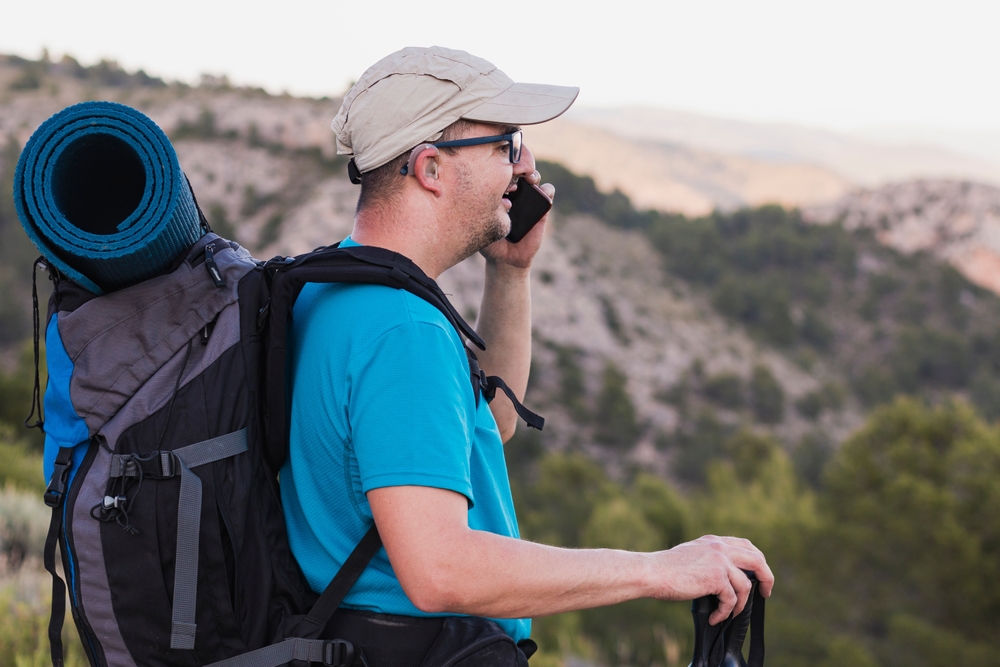 Picture this: you’re walking through a bustling airport, rolling suitcase behind you, heading off for a well-deserved summer vacation. But suddenly, your hearing aid beeps, low battery. You fumble for your charger, only to realize it’s in a checked bag. Sound familiar?
Picture this: you’re walking through a bustling airport, rolling suitcase behind you, heading off for a well-deserved summer vacation. But suddenly, your hearing aid beeps, low battery. You fumble for your charger, only to realize it’s in a checked bag. Sound familiar?
Traveling with hearing aids in the summer doesn’t have to be stressful. Whether you’re heading to the beach, the mountains, or across the country, a little planning can help you hear clearly and confidently the entire way.
At Eldorado Hearing, we help hundreds of Arizona residents prepare for the travel season. In this guide, we’ll share practical, medically sound tips to protect your hearing health and make the most of your trip.
Why Travel Can Be Tricky for Hearing Aid Users
Travel introduces unexpected hearing challenges, from sudden noise exposure to unfamiliar environments and long hours of wear. Factor in summer heat and humidity, and your hearing aids can face real stress.
Common Travel-Related Hearing Issues:
- Missed announcements due to background noise
- Ear barotrauma from altitude changes
- Increased moisture exposure (sweat, rain, humidity)
- Device malfunctions from improper storage or impact
- Communication barriers in crowded, noisy spaces
Hearing aids are essential tools, not afterthoughts. Treat them like you would medication or your passport; they deserve a top spot on your packing list.
Pre-Trip Checklist: Hearing Aid Travel Essentials
Preparation is everything. Before you zip up your suitcase, run through this checklist:
Hearing Aid Travel Kit:
- Extra batteries or a portable charger
- Hard-shell carrying case
- Cleaning kit and brush
- Drying capsule or portable dehumidifier
- Extra wax guards and domes
- A backup pair of hearing aids (if available)
Pro tip: Keep your kit in your carry-on. Checked bags can be lost or delayed, and you don’t want to be stuck without your devices.
Summer Travel Means Heat, Humidity, and Hearing Aid Hazards
Arizona travelers heading to more humid climates, like coastal states or tropical destinations, need to watch for moisture buildup in their hearing aids. Sweat, sudden rainstorms, and sticky air can all cause issues.
Protecting Your Hearing Aids in Hot Weather:
- Avoid leaving devices in direct sunlight or hot cars
- Wipe down devices regularly with a soft, dry cloth
- Use sweatbands or hearing aid covers for outdoor activities
- Remove hearing aids while applying sunscreen or bug spray
According to the Hearing Loss Association of America, moisture is one of the top causes of hearing aid malfunction, especially in the summer.
Navigating the Airport with Hearing Aids
Yes, you can wear your hearing aids through TSA checkpoints and onboard flights. They’re classified as medical devices and do not need to be removed during security screening.
Flight-Specific Tips:
- Inform TSA if you need visual cues or assistance
- Download airline apps with visual alerts for gate changes
- Use noise-reducing headphones or settings during flight
- Chew gum or yawn during takeoff and landing to ease pressure
- Switch to airplane mode if your hearing aids are Bluetooth-enabled
Altitude changes can sometimes cause temporary ear pressure or mild hearing loss, known as ear barotrauma. If your ears feel blocked or you experience ringing post-flight, contact a hearing specialist if symptoms persist.
Staying Social: Dining, Tours, and Group Activities
Summer vacations often include group tours, restaurants, and noisy social settings, which can be tough for anyone with hearing loss.
Strategies for Better Hearing in Public Spaces:
- Request seating in quieter areas (like corners or patios)
- Choose smaller, more intimate tours when possible
- Ask for printed guides or written summaries
- Let your group know you use hearing aids, they’ll often speak more clearly or face you directly
- Use smartphone apps that transcribe conversations in real-time
Don’t hesitate to advocate for yourself. Most travel and hospitality providers are more than happy to accommodate hearing needs when asked.
What If Your Hearing Aid Stops Working on Vacation?
While rare, device issues can happen mid-trip. Knowing how to troubleshoot basic problems can save your vacation.
Common Fixes:
| Problem | Quick Fix |
| No sound | Replace battery, check for blockages |
| Distorted audio | Clean mic ports, check wax guards |
| Intermittent sound | Dry the device, replace tubing if needed |
| Whistling or feedback | Reseat device, check for proper fit |
Still stuck? Call El Dorado Hearing, we offer remote support options and guidance for patients even when they’re traveling.
FAQs: Hearing Aid Travel Edition
Q: Can I swim with hearing aids?
A: Most hearing aids are water-resistant, not waterproof. Remove them before swimming or showering, and store them in a dry container.
Q: Will my hearing aids work overseas?
A: Yes, but power plugs and voltages vary. If your charger isn’t USB-compatible, bring a travel adapter.
Q: Should I turn off my hearing aids on the plane?
A: Only if instructed by flight staff. Most modern hearing aids are safe to use throughout the flight.
Travel with Confidence and Clearer Hearing
Whether you’re visiting family, cruising through the Caribbean, or road-tripping along Route 66, hearing well makes every moment more meaningful. With the right preparation, your hearing aids can support you every step of the way.
El Dorado Hearing: Your Partner in Summer Hearing Health
Planning a trip? Before you go, schedule a quick hearing check or device tune-up with Eldorado Hearing. We’ll make sure your equipment is in top shape and provide tips tailored to your destination and devices.
We also offer custom travel accessories, Bluetooth pairing help, and hearing protection options for concerts, flights, and more.
Visit us at eldoradohearing.com or give us a call to schedule your pre-travel hearing consultation.
Hear everything. Miss nothing. That’s the El Dorado way.



Leave a Reply